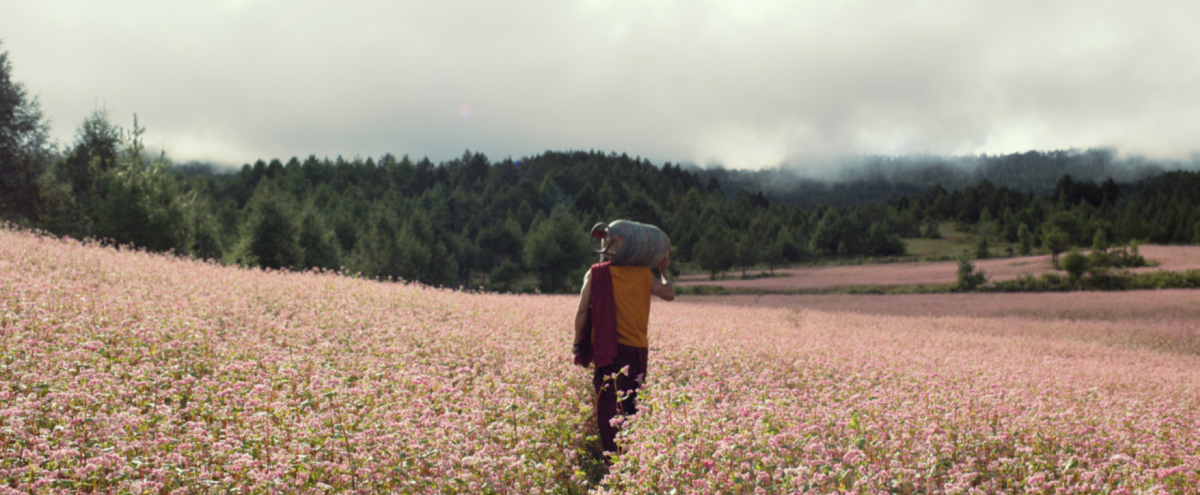
When Taiwan-based filmmaker Pawo Choyning Dorji’s first film “Lunana: A Yak in the Classroom” was accepted by the London Film Festival, he made connections around the world, from French and Swiss investors to Hollywood, as he tirelessly promoted the film, which wound up the first Bhutanese film submitted for the Oscar. It marked the first Oscar nomination for the tiny, long-isolated Buddhist country of Bhutan, which became the world’s last country to open itself to television and the Internet in 1999. With so few films produced in the small mountain country, his second film “The Monk and the Gun,” made with more actors and a bigger budget, was also submitted this year.
The movie, which debuted at Telluride, is a culture-clash story about a lama who wants his monk to find him a gun in time for the full moon, which is in four days. At the same time, a gun collector travels to Bhutan in search of an antique rifle which falls into the hands of the monk. With Dorji’s agency UTA and the Oscar nomination behind him, it was easier to finance at a higher budget. UTA is selling the film at the Toronto International Film Festival. Following Telluride and Toronto, “The Monk and the Gun” will be released in Bhutan.
For the remote mountain location of “Lunana,” Dorji took one Canon camera and used no lights. “But with this production, we were able to bring in a proper camera, lenses, a whole load of different lights,” he said in a Zoom interview with IndieWire. “And it really helped a lot. At the same time, I always tried to keep what works for me and what works for Bhutan.”
That’s why Dorji resisted suggestions of casting the American gun collector with a known star. “I still wanted to keep the production of this film something that is more relatable to Bhutan,” he said. “I didn’t want to cast someone so famous, and then suddenly have the story be about ‘oh, he went to make a film in Bhutan.’ It’s not about the story I’m trying to tell, which is about change and transition and the loss of innocence through in the mid-2000s. It got easier. But I was cautious about how to accept all the help that was coming through.”

It was hard for the film’s western producers to accept the prevalence of Buddhism in the culture. “That scene where the gun owner accepts money for the gun only to give it free to a monk,” said Dorji, “when I first sent the first cut to my producers, we had a Zoom meeting and they were like, ‘that part is very difficult to believe, it wouldn’t happen.’ In Bhutan, Buddhism is so important that it takes precedence over everything. I want to share this.”
And in Buddhism, giant phalluses are an accepted way to get rid of inhibitions on the road to Enlightenment. So Dorji made sure to put a giant red phallus in the movie. “As Bhutan becomes more modern, as we become more educated, we are forgetting these things. I grew up in Bhutan, where I saw phalluses everywhere, hanging on the doorways, painted on the walls. But as we became more modern, we Bhutanese, like the rest of the world, started feeling very uncomfortable about it. And now there’s less and less.”
To play the monk, Dorji cast charismatic Bhutanese pop star Tandin Wangchuk, and for the Lama, he cast the local Lama in the village. “I went to meet him to get permission to shoot at his stupa,” said Dorji. “And I realized, ‘He works really well. He has the voice, the look, the beard, and he’s the only Lama.’”
This time Dorji tracked multiple characters through his story, set during 2006’s mock elections ahead of the first democratic elections after the monarchy disbanded. “Each character represents different aspects of Bhutan at that time,” said Dorji. “We have the Lama and the monk that represents the traditional culture. Then you have the guide that represents the urban Bhutanese, who is open to what Bhutan is going through, he has his tattoos, he smokes a cigarette all the time. And then, we have the village family caught in the middle: you have the wife rooted in family and tradition, and then the husband who wants to find his place in this modern Bhutan.”
Dorji wants to show the world the changes that Bhutan explored during this period, he said: “And to remind younger generations of Bhutanese about the change and transition we went through. I come from a country that was isolated till the mid-2000s. I grew up in a place where there was no TV, no internet, no McDonalds. I had my first Coca Cola when I was 13 years old. Our country isolated itself to safeguard our way of life, our culture. Because we saw what happened to Tibet, to Sikkim. So to be that last Himalayan kingdom, we isolated ourselves. And at the end, we realized that we were left behind, we were the only non-modern entity in the modern world. We were the last country to connect to the television, we were the last country to connect to the Internet. When TV first came in, we were taking off posters of our Buddhas, our deities, and putting up posters of pop icons like James Bond and Rambo. Overnight, David Beckham became more sacred than our deities. And I wanted to capture that. The mock election did happen, and the yellow party did win. The king is working so hard to introduce democracy, and the people are still voting for him.”
Next up: Dorji has long wanted to adapt the book “Death of Vishnu,” from India, he said, has obtained the film rights, and is writing the script: “It’s my first project that goes beyond the borders of Bhutan, and India is the most logical choice.”















